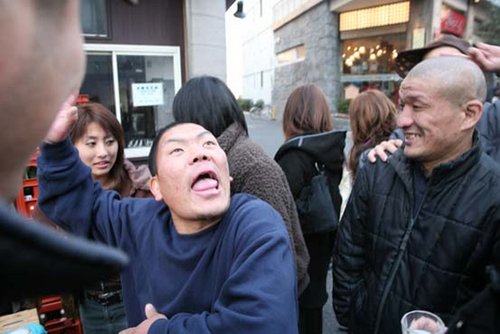Boris Mikhailov
dal 5/11/2007 al 21/12/2007
Segnalato da
5/11/2007
Boris Mikhailov
Galerie Barbara Weiss (old location), Berlin
Banzai! The artist photographs street scenes in Tokyo, which at first sight seem to show quite normal people on normal streets. A closer look reveals details that we, as Western viewers, find strange, weird or even grotesque.

Banzai!
In his third solo exhibition at Galerie Barbara Weiss Boris Mikhailov
(born 1938 in Kharkov, Ukraine) is presenting photos taken in Tokyo in
winter 2006/07 for the first time. Mikhailov first attracted attention
in the West with his photo series of homeless people in Kharkov, Case
History, and has received many international awards for his photography,
including the Hasselblad Award.
"I want to know what is real Japan and what is the difference between
Japan and me", was Boris Mikhailov's motto, as he embarked on his first
long stay in Japan with his digital camera. With a selection of around
thirty framed and unframed colour photographs in very differing formats
and quality, Mikhailov presents a concentrate of his observations on
life in a large Japanese city. His aim is also to give the viewer an
opportunity to reflect on his or her own expectations of what a "Japan
exhibition" might be.
The exhibition /Banzai!*/ concentrates on perfectly "normal" life in the
city, quite similar to Mikhailov's earlier exhibition at Galerie Barbara
Weiss, /In the Street (Berlin),/ 2004. Mikhailov photographs street
scenes spontaneously, which at first sight seem to show quite normal
people on normal streets. A closer look reveals details that we, as
Western viewers, find strange, weird or even grotesque, a feeling we
share with the photographer himself. Mikhailov does not show us the hip,
consumer-oriented youth of the metropolis, nor does he show us typical
businesspeople. Instead he looks at old, poor, or particularly small
people, and is interested in their sense of isolation, or their
relations to each other, their faces, gestures, clothes, and body language.
Another focus in this exhibition is the subject of "love", which
Mikhailov also visualises by means of photographs from a museum of the
erotic. Here -- and elsewhere - Mikhailov is interested in the question
as to how traditional Japanese society and also sexuality and
pornography have been transformed through American influence since the
capitulation of Japan in 1945.
A third group of photographs turns to "politics" -- in an ironic gesture
Mikhailov shows himself with his fist raised in defiance, imitating the
well-known writer and political activist Mishima Yukio (1925-1970), who
committed seppuku ritual suicide (hara-kiri) after a failed appeal to
his supporters. The artist also confronts us with pictures of homeless
people lined up at a soup kitchen, or with people who live under a
permanent sense of fear after the poison gas attack of 1995, and now
wear face masks as they move through the city.
Boris Mikhailov's critical and respectful view is aimed at various
cultures. As an observer who was born in the former Soviet Union, he
reveals social ambivalence that is not normally seen in standard clichéd
images of Japan.
In English /Banzai/ means "Hurrah!", as a battle cry.
Galerie Barbara Weiss
Zimmerstr. 88-89 - Berlin
Free admission



